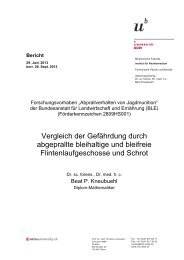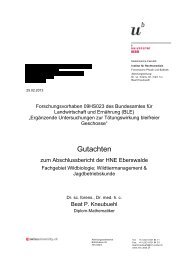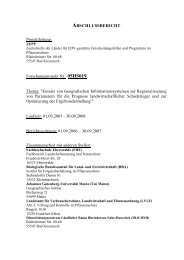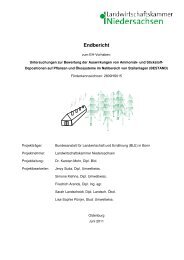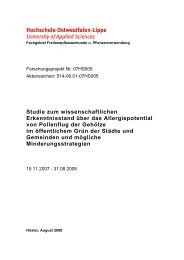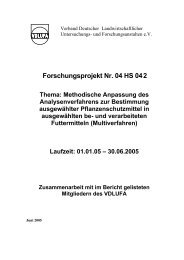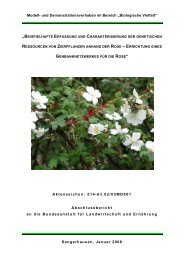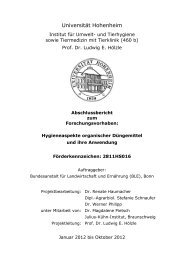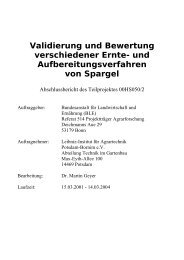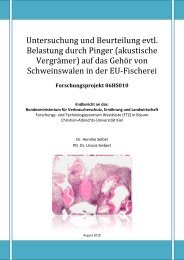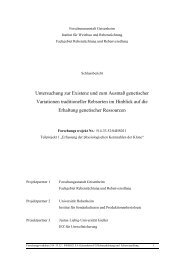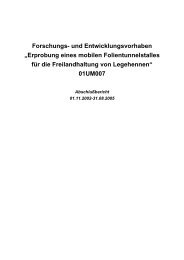Abschlussbericht Projekt: „Verminderung der ... - BLE
Abschlussbericht Projekt: „Verminderung der ... - BLE
Abschlussbericht Projekt: „Verminderung der ... - BLE
Erfolgreiche ePaper selbst erstellen
Machen Sie aus Ihren PDF Publikationen ein blätterbares Flipbook mit unserer einzigartigen Google optimierten e-Paper Software.
despite the fact that temperatures during harvest and tuber water concentration were similar<br />
in 2006 and 2007. Presented results correspond to findings of Herppich et al. (2004) indicating<br />
that, at a given temperature, carrots show a lower toughness at a lower pressure potential.<br />
When water uptake was restricted and increasing specific gravity indicated a higher dry<br />
matter concentration due to a higher amount of starch granules accompanied with a lower<br />
water concentration of tissues the tuber tissues became more elastic due to the lower pressure<br />
potential and the decreased elastic modulus. The susceptibility to blackspot might<br />
increase because of a reduced cell wall tension and/or a higher concentration of starch<br />
granules as it was discussed by Bajema et al. (1998a) and Scanlon et al. (1998).<br />
Blackspot susceptibility and water status of stored tubers. Processing industry demands<br />
a permanent supply of potato tubers throughout the year. Therefore potato storage is essential<br />
in which tubers may un<strong>der</strong>go pronounced physiological changes (Laza et al., 2001;<br />
Scanlon et al., 1996). Despite the fact that these physiological changes of potato tubers<br />
have been widely studied (Alvarez and Canet, 2002; Baritelle and Hyde, 2001; Lærke,<br />
2001; Scanlon et al., 1996) information are still incomplete in which way low temperatures<br />
might influence storage physiology.<br />
In both years, tubers obviously accumulated osmotically active solutes which significantly<br />
decreased the water potential without decreasing pressure potential during the entire storage<br />
period. Within this process of osmotic adjustment (Galindo et al., 2004a) tissue sap<br />
osmolality increased in average by more than 100 mmol kg -1 due to the hydrolysis of<br />
starch to sucrose (Espen et al., 1999). This resulted in a decline in osmotic potential of 0.2<br />
MPa and more. Osmotic adjustment may be a direct response to cold temperatures helping<br />
to reduce the freezing temperature of the tissue sap, thus, increasing tuber frost resistance.<br />
As a result of this process tubers may also stabilize or even increase their pressure potential<br />
despite a decreasing water potential (Galindo et al., 2004b). Remained pressure potentials<br />
during the entire storage indicated a steady membrane integrity, which was also not influenced<br />
by osmotic adjustment during storage corresponding to findings from Olsen et al.<br />
(2003/4). The absolute water concentration did not change during storage, while a decreasing<br />
water concentration would have indicated enhanced respiration usually accompanied<br />
with sprouting or senescence (Suttle, 2007 ), which was not observed in the present study.<br />
The tubers obviously maintained their vitality during storage as also described by Galindo<br />
et al. (2004b) and Heuer and Nadler (1998).<br />
Blackspot susceptibility and tuber water status-synopsis. Observed variation in blackspot<br />
susceptibility at similar pressure potentials might be attributed to non-aqueous constituents<br />
of tissue. Both parameters are often reported to be positively correlated within<br />
potato tubers (Baritelle and Hyde, 2003; Peters et al., 2005; Wrigth et al., 2005). Throughout<br />
the whole shelf time of eight months blackspot significantly increased with the specific<br />
gravity. Specific gravity is generally assumed to be a cultivar characteristic (Laboski and<br />
189



